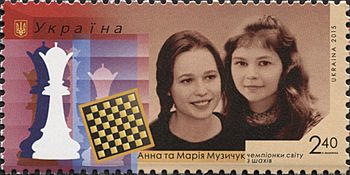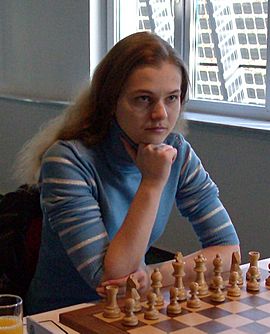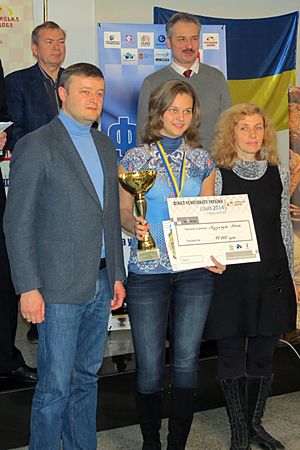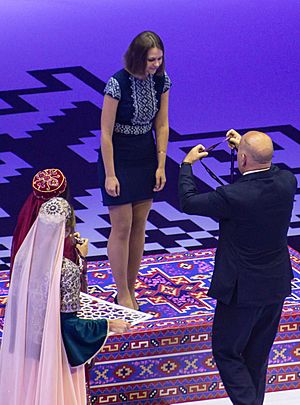Anna Muzychuk facts for kids
Quick facts for kids Anna Muzychuk |
|
|---|---|
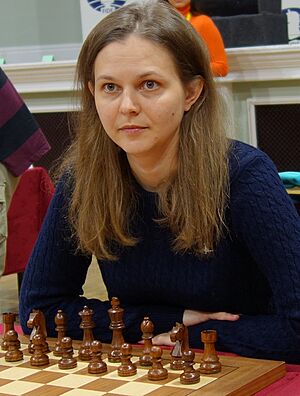
Muzychuk in 2023
|
|
| Full name | Anna Olehivna Muzychuk |
| Country | |
| Born | 28 February 1990 Lviv, Ukrainian SSR, Soviet Union |
| Title | Grandmaster (2012) |
| FIDE rating | 2535 (March 2026) |
| Peak rating | 2606 (July 2012) |
| Peak ranking |
|
Anna Olehivna Muzychuk (born February 28, 1990) is a Ukrainian chess superstar who holds the title of Grandmaster (GM), the highest honor a chess player can achieve. She is only the fourth woman in history to reach a FIDE rating of 2600, a score that puts her among the world's best players.
Anna is a three-time world champion in fast chess. She won the Women's World Rapid Championship in 2016 and the Women's World Blitz Championship twice, in 2014 and 2016. In classical chess, where games are much longer, she was the runner-up in the 2017 Women's World Championship.
Chess runs in her family. Her younger sister, Mariya, is also a Grandmaster and was the Women's World Champion in 2015. Anna's parents are both chess coaches and taught her how to play when she was just two years old.
Contents
A Chess Prodigy
Learning the Game
Anna Muzychuk was born in Lviv, Ukraine. She and her younger sister Mariya grew up in the nearby city of Stryi. Their parents were professional chess coaches who taught them the game at a very young age. Her father first showed her how the pieces move on a giant chessboard in a park.
By age five, Anna was already competing in tournaments. She quickly became a chess prodigy, a young person with amazing talent. By the time she was ten, she could beat both of her parents in a game of chess.
Youth Championships
Anna's talent was clear in major European and world youth tournaments. Starting at age six, she won medals for nine years in a row at the European Youth Chess Championship. She won six gold medals in different age groups.
She also won the Ukrainian girls' national championships three times. At just 13 years old, she won the main Ukrainian Women's Chess Championship. On the world stage, she won a gold medal at the World Youth Championship in the under-16 girls' category.
For ten years, from 2004 to 2014, Anna played for the country of Slovenia because of disagreements with the Ukrainian Chess Federation. Even though she represented Slovenia, she continued to live in Ukraine.
Professional Chess Career
Becoming a Grandmaster
As a teenager, Anna continued to improve. She earned the title of International Master (IM) at age 17. To become a Grandmaster, a player must achieve excellent results, called "norms," in very difficult tournaments. Anna earned her final norm in 2011 at the European Women's Team Chess Championship. She had an amazing performance, scoring 8½ points out of 9 games. At age 21, she was officially awarded the Grandmaster title.
In 2012, her rating climbed to 2606. This made her the fourth woman ever to cross the 2600 mark, a huge achievement in the chess world. For a time, she was ranked as the #2 female player in the world.
World Champion in Fast Chess
While Anna is a top player in classical chess, she has had incredible success in faster versions of the game.
- Blitz Chess: In blitz, players have only a few minutes for the entire game. Anna won the Women's World Blitz Championship in 2014.
- Rapid Chess: In rapid, players have more time than blitz but less than classical. Anna won the Women's World Rapid Championship in 2016.
- A Historic Double Win: In 2016, she won the World Blitz Championship again. By winning both the rapid and blitz titles in the same year, she joined a small group of players, including World Champion Magnus Carlsen, to ever achieve this.
In May 2014, Anna switched back to representing her home country of Ukraine. She said she was happy to return, partly because her sister Mariya also played for the Ukrainian team.
World Championship Runner-Up
In 2017, Anna came very close to winning the classical Women's World Championship. She made it all the way to the final match against Chinese player Tan Zhongyi. The match was tied after the four classical games, so it went to a rapid tiebreak. Anna lost the tiebreak, finishing as the runner-up.
Standing for Her Principles
At the end of 2017, the World Rapid and Blitz Championships were held in Saudi Arabia. Anna decided not to go, even though it meant giving up her two world titles. She made this choice to protest the country's rules that restrict women's freedom.
She explained that she did not want to play by someone else's rules, be forced to wear an abaya (a type of robe), or need to be accompanied by a man to go outside. Her decision was shared widely on social media and received a lot of support. She said she was ready to stand for her principles, even if it meant losing her titles and prize money.
Team Competitions
Anna has been a key player for both Slovenia and Ukraine in team events.
- Chess Olympiad: This is a huge international tournament where countries compete as teams. After returning to play for Ukraine in 2014, her team won medals in three straight Olympiads: bronze in 2014, bronze in 2016, and silver in 2018. In 2016, Anna also won an individual gold medal for her outstanding performance on the top board.
- European Team Championship: Playing for Ukraine, her team won a silver medal in 2015 and a bronze medal in 2017.
Playing Style
Anna prefers to start her games as White with the King's Pawn opening (moving her king's pawn two squares forward). She is known for being an active player who prepares her openings very well. She has said her style is similar to that of Fabiano Caruana, another top Grandmaster who is known for his deep preparation and positional skill.
Personal Life
Anna has a close and friendly relationship with her sister, Mariya. Even though they are both top chess players, they have played very few competitive games against each other. Anna says she is the calmer of the two and enjoys quiet activities like reading.
In 2021, she was a co-host for the official commentary of the World Chess Championship match between Magnus Carlsen and Ian Nepomniachtchi. She also became the Norway Chess Women’s Champion in 2025.
Notable Game
| This section uses algebraic notation to describe chess moves. |
In 2020, Anna played a brilliant game against Israeli Grandmaster Ori Kobo. The game was so creative and exciting that it won the tournament's "brilliancy prize."
In the middle of the game, Anna offered to sacrifice her bishop and then her queen. Her opponent couldn't accept the queen sacrifice because it would lead to a checkmate. Anna went on to win the game with a series of powerful and well-calculated moves.
Awards and Honors
See also
 In Spanish: Anna Muzychuk para niños
In Spanish: Anna Muzychuk para niños
 | Delilah Pierce |
 | Gordon Parks |
 | Augusta Savage |
 | Charles Ethan Porter |


